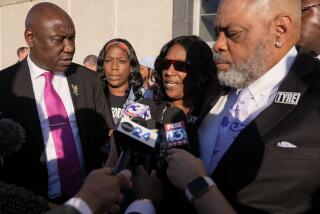Nichols Appeals to Judge Before Bombing Sentencing
- Share via
DENVER — Terry L. Nichols, convicted of conspiracy to bomb the Oklahoma City federal building, said Monday in a carefully worded letter to the judge in the case that he would not have taken part in a terrorist attack.
“My family means the world to me, and I would not do a horrible thing such as a terrorist bombing and bring shame on not just my family but the family name also,” the father of three wrote.
Nichols, who turns 43 next week, is to appear at a sentencing hearing before U.S. District Judge Richard P. Matsch on Wednesday. Nichols hopes to avoid spending the rest of his life in prison.
Nichols was convicted in December of helping to plan the April 19, 1995, bombing that killed 168 people and injured more than 500.
“I could not murder innocent men, women and especially children,” he wrote to Matsch.
But in his 16-page handwritten letter he did not specifically deny a role in the bombing of the Alfred P. Murrah Federal Building.
He said he should have more closely questioned Timothy J. McVeigh, his former army buddy who has been convicted of the bombing. “Perhaps I should have questioned McVeigh more about certain things,” he said.
“If I did anything to contribute to the cause of the Oklahoma City bombing I am sorry, I’m truly sorry,” he said.
Nichols’ only son, Josh, a 10th-grade student, told the judge that “my father is not the kind of person who would do something to hurt so many people. My father is a very good man.”
Their letters and those of Nichols’ mother and father were among 29 submitted to the judge before the hearing in which Nichols’ lawyers will try to convince the judge to sentence him to 75 months or less in prison.
But prosecutors contended in a brief that life without parole is “the only legal and moral sentence . . . for this nation’s worst act of domestic terrorism.”
Matsch will hear arguments from both sides but will not sentence Nichols until a later date, possibly as early as next month.
The job of settling on a punishment fell to Matsch after jurors failed to agree on what Nichols’ punishment should be.
More to Read
Sign up for Essential California
The most important California stories and recommendations in your inbox every morning.
You may occasionally receive promotional content from the Los Angeles Times.













